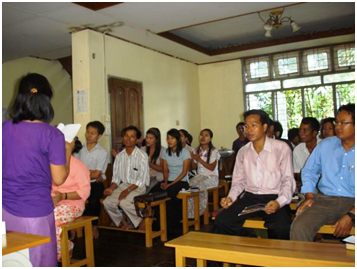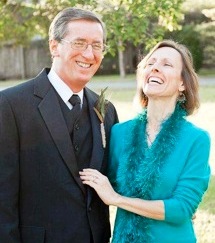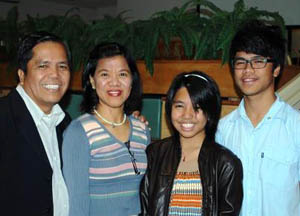Dear Brothers and Sisters in Christ,
 I marvel at the way God created humanity in his own image, giving us rich and vivid imaginations and creativity. We can use this power of imagination and creativity to the praise and honor of God. Unfortunately, some use their God-given abilities to imagine God does not exist and they try to find ever more creative ways to prove it.
I marvel at the way God created humanity in his own image, giving us rich and vivid imaginations and creativity. We can use this power of imagination and creativity to the praise and honor of God. Unfortunately, some use their God-given abilities to imagine God does not exist and they try to find ever more creative ways to prove it.
There have always been people who do not believe in God. However, in recent years, a small group who refer to themselves as the “New Atheists,” have been growing in influence. Writers like Daniel Dennet, Richard Dawkins and Sam Harris have become household names. They are vociferous in insisting that God does not exist and they ridicule anyone who believes otherwise. Some of the New Atheists are highly educated and advance what seem to be persuasive arguments. This can be disconcerting to believers, but it should not be. In fact, there is nothing new about their “new” arguments.
I have read many of the New Atheists’ books. They are usually well written, and some are quite entertaining, although others cannot disguise their anger. However, they share a common fault.
These atheists attack theism (belief in God) on the grounds that you cannot prove scientifically, beyond any doubt, that God exists. While that may be true, it does not mean the atheists have won the argument. Their job is to prove that God does not exist. If they are to be successful, they must offer a convincing and scientifically viable alternative to “In the beginning, God created the heavens and the earth.”
That does not give us an excuse to hide behind the simplistic arguments of Christian fundamentalism. Our astounding advances in understanding the natural world certainly take the question of where it all came from to new levels of sophistication. However, we still cannot explain how “something” came out of “nothing.” There have been some imaginative and creative ideas, but that is all they are. There is not a shred of genuine evidence to support them.
Richard Dawkins is perhaps the best known of the New Atheists. He is a distinguished professor and scientist at Oxford University and has written several books arguing for atheism. According to Dawkins, belief in God is silly. In interviews, he says on a scale of one to seven, with one being 100% certainty in the existence of God and seven being 100% certainty that he does not exist, he places himself at six. Hmm—that actually makes him an agnostic rather than an atheist.
Before we say, “I told you so!” Dawkins explains: “I am agnostic only to the extent that I am agnostic about fairies at the bottom of the garden.” However, that sidesteps the question. His task is not to prove there are no fairies at the bottom of his garden. It is to prove conclusively that God does not exist.
Dawkins does not even interact with the arguments for God’s existence. It appears that his most formidable retort is “if God designed the universe, then who designed God?” While that might be, for an agnostic, a reasonable question, it is not a knockout blow to belief in God. In fact, it’s the wrong question (a category mistake) because such a question assumes that God is a creation, a creature—and the Christian God is not. His question is like asking, “What color is the number five?” Dawkins’ anger against religion often seems to cloud his judgment and his work is faulted scientifically by his own peers—both Christian and non-Christian.
Another New Atheist, Daniel Dennett tries to explain religion in terms of evolutionary theory. He fits into the broad tradition of naturalist explanations of religion, a tradition that includes Ludwig Feuerbach, Karl Marx and Sigmund Freud. Dennett believes that the benefits of religion originate entirely inside human minds. He asserts that there are no spiritual realities existing inside or outside of us. He advances naturalist explanations for the origins of the belief in God and gods. It is the same old circular argument, which presupposes its conclusions. Since only natural things exist then any explanation for a supposed supernatural God must be the product of purely natural causes. Dennett builds upon a suggestion of his angry fellow, Richard Dawkins, that something they call “memes” exist. These are ideas or concepts or beliefs that arise and then are passed on to others. Like genes, memes are assumed to act like a sort of cultural genetic replicator that keeps us believing in God.
Most scientists say that there is no evidence for these things. As pointed out by Simon Conway Morris, professor of evolutionary paleobiology at Cambridge, memes seem to have no place in serious scientific reflection. “Memes are trivial, to be banished by simple mental exercises. In any wider context, they are hopelessly, if not hilariously, simplistic.”
The New Atheists have convinced themselves that all Christians are trapped in false belief. They don’t like it when the flaws in their own reasoning are pointed out. They like it even less when that criticism comes from their own ranks. The late philosophy professor, Anthony Flew, had been a leading champion of atheism for more than a half-century. But in one of his last books, he came to a scientific conclusion that atheism is not logically sustainable. He held on to a kind of deism and did not go all the way and embrace the God of the Bible, but I imagine he does now.
The existence (or not) of the God of the Bible does not stand or fall on scientific proof that begins and ends with nature or creation. God is not interested in having his existence demonstrated as the result of a successful experiment. He wants a successful relationship with us as our Creator and Reconciler, and he proved himself to us through the birth, life, death and resurrection of Jesus. Our eternal relationship is secure in him. And—however much the New Atheists might deny it—so is theirs.
Your brother in Christ’s service,
Joseph Tkach











